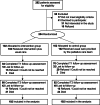Effect of motivational interviewing to promote advance care planning among palliative care patients in ambulatory care setting: a randomized controlled trial
- PMID: 39891169
- PMCID: PMC11786551
- DOI: 10.1186/s12904-025-01667-9
Effect of motivational interviewing to promote advance care planning among palliative care patients in ambulatory care setting: a randomized controlled trial
Erratum in
-
Correction: Effect of motivational interviewing to promote advance care planning among palliative care patients in ambulatory care setting: a randomized controlled trial.BMC Palliat Care. 2025 Mar 14;24(1):72. doi: 10.1186/s12904-025-01692-8. BMC Palliat Care. 2025. PMID: 40087737 Free PMC article. No abstract available.
Abstract
Background: Many patients have mixed feelings about end-of-life care, even when facing life-limiting conditions. Motivational interviewing might be useful for supporting patients in evoking reasons for advance care planning. This study aimed to examine the effects of an advance care planning program adopting motivational interviewing among palliative care patients.
Methods: A two-arm parallel randomized controlled trial was conducted between January 2018 and December 2019 in the palliative care clinics of two hospitals. Adult patients who were newly referred to palliative care services, with a score of 60 or higher in the Palliative Performance Scale and mentally competent, were eligible for the study. While all participants received palliative care as usual care, those in the intervention group also received the advance care planning program through three home visits. The primary outcome was the readiness to discuss and document end-of-life care decisions, and the secondary outcomes included decisional conflict, perceived stress, and quality of life.
Results: A total of 204 participants (mean [SD] age, 74.9 [10.8]; 64.7% male; 80.4% cancer) were recruited. Generalized estimating equation analyses showed a significant improvement in readiness for advance care planning behaviors in the intervention group compared with the control group at 3 months post-allocation (group-by-time interaction, appointing proxy: β = 0.80; 95% CI, 0.25-1.35; p = .005; discussing with family: β = 0.76; 95% CI, 0.22-1.31; p = .006; discussing with medical doctors: β = 0.86; 95% CI, 0.30-1.42; p = .003; documenting: β = 0.89; 95% CI, 0.36-1.41; p < .001). The proportions of signing advance directives and placing a do-not-attempt cardiopulmonary resuscitation order were significantly higher in the intervention group, with a relative risk of 3.43 (95% CI, 1.55-7.60) and 1.16 (95% CI, 1.04-1.28), respectively. The intervention group reported greater improvements in social support and value of life than the control group immediately after the intervention. Significant improvements in decisional conflicts and perceived stress were noted in both groups.
Conclusions: Motivational interviewing was effective in supporting patients to resolve ambivalence regarding end-of-life care, thereby increasing their readiness for discussing and documenting their care choices.
Trial registration: ClinicalTrials.gov Identifier: NCT04162912 (Registered on 14/11//2019).
Keywords: Advance care planning; Behavioral change; Medical decision; Motivational interviewing; Palliative care.
© 2025. The Author(s).
Conflict of interest statement
Declarations. Ethics approval and consent to participate: The ethical approval for this study was obtained from the Kowloon East Cluster Research Ethics Committee and the New Territories East Cluster Research Ethics Committee of the Hong Kong Hospital Authority. The study was conducted in accordance with the Declaration of Helsinki. Written informed consent for participating in the study was obtained from all participants prior to the study. All participation is on a voluntary basis, and participants can withdraw from the study at any time without reprisal. Consent for publication: Not applicable. Competing interests: The authors declare no competing interests.
References
-
- Chan HY, Pang SM. Readiness of Chinese frail old age home residents towards end-of-life care decision making. J Clin Nurs. 2011;20(9–10):1454–61. - PubMed
Publication types
MeSH terms
Associated data
Grants and funding
LinkOut - more resources
Full Text Sources
Medical


